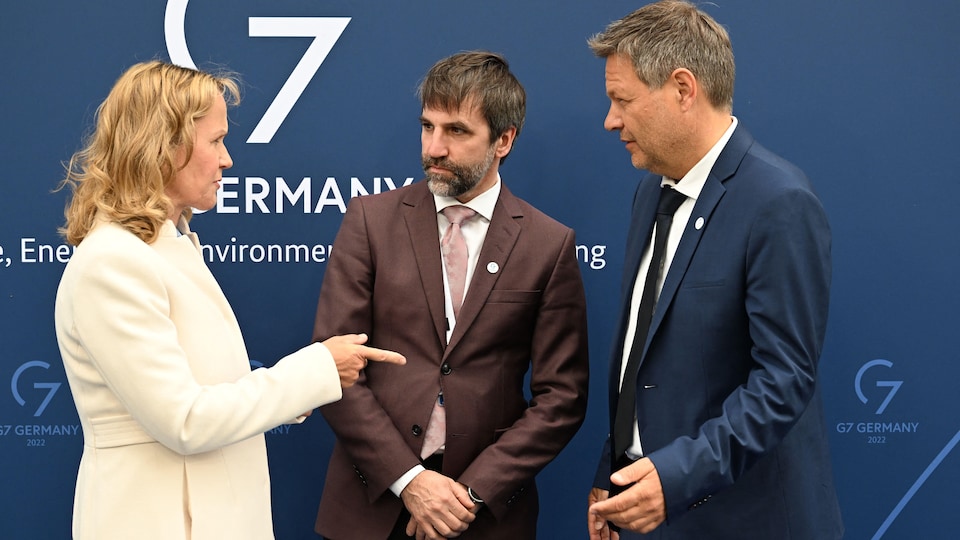According to Canada’s Minister of Environment and Climate Change, Steven Guilbeault, the war in Ukraine and Europe’s need to rid itself of Russia’s oil and gas are not preventing G7 members from thriving in their fight against change. of climate.
We did not deviate from our goalsSteven Guilbeault was received at a telephone press conference he gave on Friday, from Berlin, along with his counterpart at Natural Resources, Jonathan Wilkinson.
The two ministers took part this week in the German capital at a meeting of climate and energy ministers that lasted three days.
The energy crisis rocking Europe in the context of the war in Ukraine has prompted experts and journalists to predict a recession in climate talks in Berlin.
But this is far from the casesaid Mr. Guilbeault, citing the resolution of G7 member countries to phase out the generation of coal-fired electricity without mitigation devices (i.e., no carbon capture and storage devices to reduce emissions).
In Berlin, environment ministers also agreed to decarbonize power grids by 2035, and phase out international funding for fossil fuel projects by the end of 2022, among other thing.
Compared to last year, progress has been made, assured Mr. Guilbeault, who participated for the first time as a minister at a G7 meeting on the environment. The man who co -founded and led Équiterre and became campaign manager for Greenpeace inherited the environmental portfolio in October 2021, shortly before the Glasgow Climate Change Conference (COP26).
The meeting in Berlin was confirmed abundantinsisted Mr. Guilbeault, which resulted in at a level of understanding and cooperation not yet seen in the G7.
And it is desirable, because we cannot wait, the world cannot waithe says.
When it comes time to discuss ways to meet their energy needs without relying on Russia, G7 member countries are relying on Canada, Steven Guilbeault said. They do business in Canada because we have a greenhouse gas reduction plan [GES]he cites in other examples.
The transition from oil to clean energy
The world’s fourth-largest oil producer, Canada responded to European requests for assistance by announcing at the end of March an increase of approximately 5% in its black gold exports.
Canadian industry has the capacity to gradually increase its oil and gas exports by approximately 300,000 barrels per day (200,000 barrels of oil per day and 100,000 barrels of oil equivalent per day of natural gas) over of 2022, to replace Russian oil and gassaid Minister Jonathan Wilkinson at the end of March.
The latter indicated on Friday that Canada could no longer provide.
Although it is necessary for European countries to free themselves from their dependence on Russia’s oil and gas, they are resisting the truth, explained Steven Guilbeault, citing an interview he had in Berlin with the vice-German and Chancellor Robert Habeck. The latter co-chairs the Alliance 90/Les Verts party and is certainly not in favor of fossil fuels, Mr. Guilbeault said.
But a period of transition was imposed on the Germans. The fact is that Germany imports 50% of its natural gas from Russia, says Canada’s environment minister. These imports must be replaced in a very short time.
To accelerate the transition of Europeans to clean energy, and to establish reliable supply chains of this energy, Canada could play a role by exporting hydrogen to the European continent, according to Minister Wilkinson .
Asked if Canada would export hydrogen green, therefore produced without greenhouse gas emissions using wind, solar or hydroelectricity, Jonathan Wilkinson replied that the country’s eastern provinces, such as Quebec, could produce this type of hydrogen for Europe. Western provinces can be called upon to provide hydrogen produced using natural gas, often referred to asblue hydrogen.
There are a lot of conversations going on today in some provinces about hydrogensaid Minister Wilkinson.
The Group of Seven countries, comprising Canada, France, Germany, Italy, Japan, the United Kingdom, the United States and the European Union, have also pledged to end, starting this year, all international financing of projects with relation to fossil fuels. A commitment made by Canada at COP26 last year in Glasgow, Scotland.
G7 members also agreed to double funding for climate change adaptation in developing countries, which is in line with the goal of member countries to mobilize 100 billion dollarswill we read in the press release published by Ottawa.
These promises will be presented to heads of state next month at the G7 summit in Elmau, Germany.
Source: Radio-Canada
